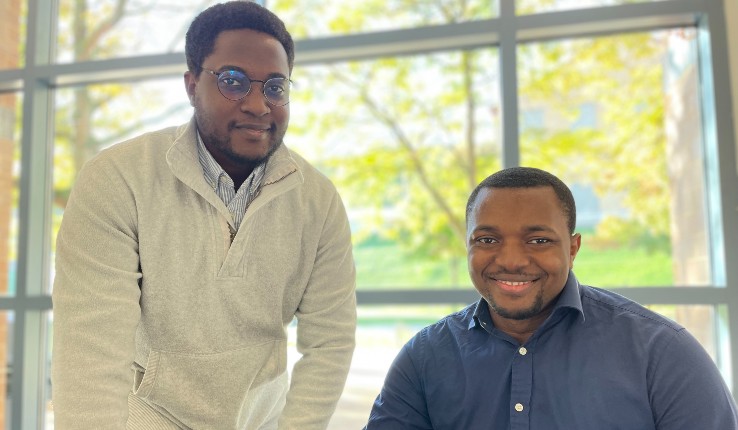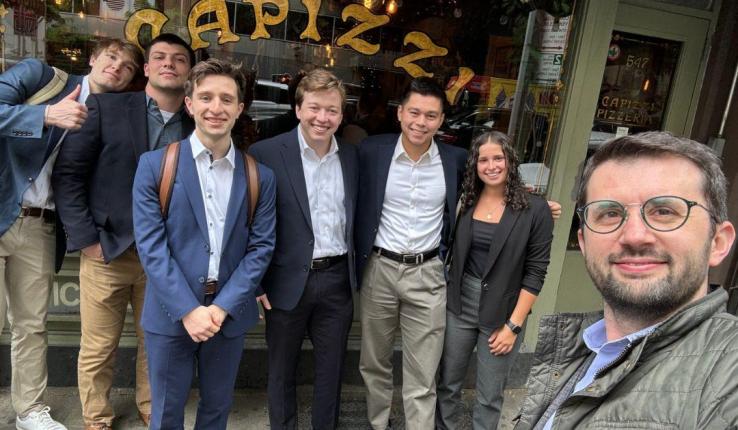Meteorologists use weather models to make their forecasts. Quants (quantitative analysts) use the weather to forecast the ups and downs of the commodities market. Perusing weather patterns instead of financial statements to predict future financial performance is considered using alternative data signals.
That’s just what Dara Ofulue and Olu Adebayo are working on—a tool that, based on historical weather data, will generate accurate trading signals for energy futures.
Ofulue and Adebayo are students in the Masters of Financial Engineering program at Lehigh Business. Both started the 31 credit-hour program in August and hope to graduate in 2024.
“I’m actually writing the algorithms and scraping the data,” says Ofulue, whose undergraduate degree is in electrical and electronics engineering.
“I’m going to be populating the climate risk variables and how they trigger demand and how investors react to them,” says Adebayo, whose background is finance and accounting in investment and retail banking.
Right now, they say they’re focused on determining if there is a relationship between past daily temperature changes in specific cities and the price and amount of futures and commodities traded.
“I’ve learned a lot in just a few weeks from the practical aspects of applying these statistical models,” says Ofulue.
“It's a pretty exciting subject area,” says Adebayo. “There's a lot on climate risk and weather conditions right now that investors are concerned about.”
The partnership started three months before the start of classes on a platform the MFE program has for new students to get to know each other. It was there the students had the opportunity to select projects based on their interests. Ofulue and Adebayo are working on three projects apiece. Each project usually has an industry sponsor. The projects range from focusing on a specific company's needs to more general concepts such as alternative data signals.
“This keeps them very busy,” says Professor Patrick Zoro, MFE program manager, “but it helps them understand what direction they want to go when they graduate.”
Ofulue already knows his direction. “The ideal job for me is to find a research paper with a great idea and write the code that turns it into an actual working product.”
Ofulue and Adebayo say that using the weather to predict market outcomes isn’t a new idea, and that there are other factors they must consider, like climate change, war and local economies, but their goal is to hone the technique and gather as many different types of alternative data as possible. “What we are trying to do here is quantify the relationships to determine how much effect these factors will actually have,” says Ofulue.
“Alternative data is where everything is right now,” says Zoro. “Historically, the curriculum was taught based on financials—if a company doesn’t make money, its stock doesn’t go anywhere. But now, because all types of data are becoming more available, everybody wants that edge. For example, there was a company we worked with that was collecting the data of the movement of trucks in and out of warehouses.”
“When I checked on the other schools, I couldn't see any projects the students were working on,” says Ofulue. “I mean, Professor Zoro has a whole YouTube channel dedicated to MFE projects. I'm like, okay, these guys are working on this stuff.”
“It's really fast paced,” says Adebayo. “The professors are really here to help you grow. They’re engaging. You don't get that a lot. And the networking events are brilliant!”
Ofulue and Adebayo say they haven’t finalized anything as of now. “Alternative data on its own might not be enough to make trade decisions,” says Ofulue. “This is the first step, quantifying a relationship and experimenting with how it can be used.”
“I expect Dara and Olu will continue working on this project even after the semester is over. This is not in a syllabus,” Zoro says. “These are the kind of students we have here.”
By Rob Gerth





